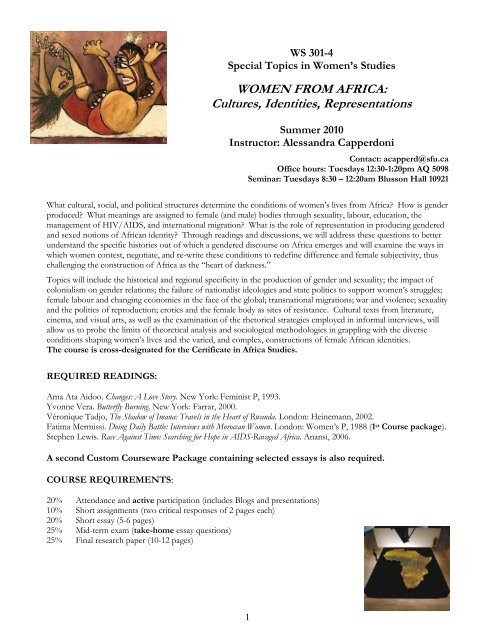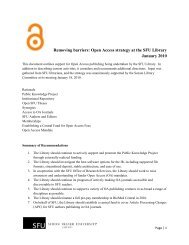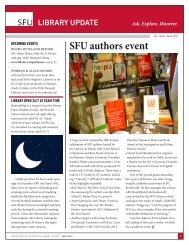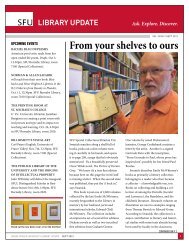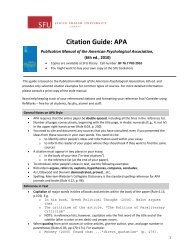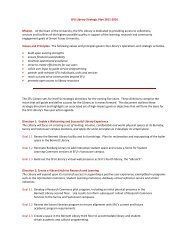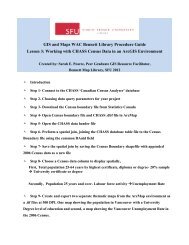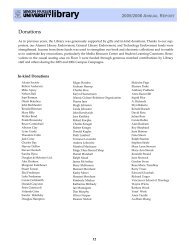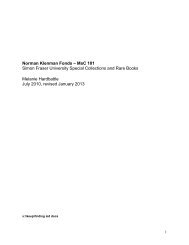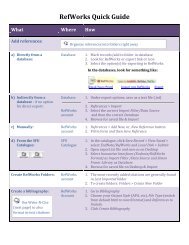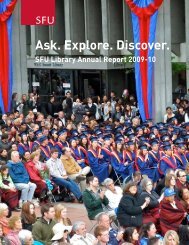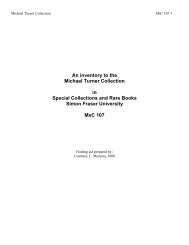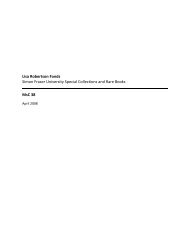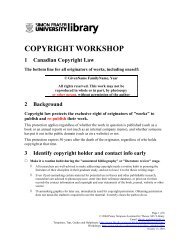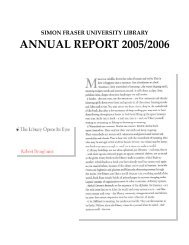WOMEN FROM AFRICA: Cultures, Identities ... - SFU Library
WOMEN FROM AFRICA: Cultures, Identities ... - SFU Library
WOMEN FROM AFRICA: Cultures, Identities ... - SFU Library
Create successful ePaper yourself
Turn your PDF publications into a flip-book with our unique Google optimized e-Paper software.
WS 301-4Special Topics in Women’s Studies<strong>WOMEN</strong> <strong>FROM</strong> <strong>AFRICA</strong>:<strong>Cultures</strong>, <strong>Identities</strong>, RepresentationsSummer 2010Instructor: Alessandra CapperdoniContact: acapperd@sfu.caOffice hours: Tuesdays 12:30-1:20pm AQ 5098Seminar: Tuesdays 8:30 – 12:20am Blusson Hall 10921What cultural, social, and political structures determine the conditions of women‟s lives from Africa? How is genderproduced? What meanings are assigned to female (and male) bodies through sexuality, labour, education, themanagement of HIV/AIDS, and international migration? What is the role of representation in producing genderedand sexed notions of African identity? Through readings and discussions, we will address these questions to betterunderstand the specific histories out of which a gendered discourse on Africa emerges and will examine the ways inwhich women contest, negotiate, and re-write these conditions to redefine difference and female subjectivity, thuschallenging the construction of Africa as the “heart of darkness.”Topics will include the historical and regional specificity in the production of gender and sexuality; the impact ofcolonialism on gender relations; the failure of nationalist ideologies and state politics to support women‟s struggles;female labour and changing economies in the face of the global; transnational migrations; war and violence; sexualityand the politics of reproduction; erotics and the female body as sites of resistance. Cultural texts from literature,cinema, and visual arts, as well as the examination of the rhetorical strategies employed in informal interviews, willallow us to probe the limits of theoretical analysis and sociological methodologies in grappling with the diverseconditions shaping women‟s lives and the varied, and complex, constructions of female African identities.The course is cross-designated for the Certificate in Africa Studies.REQUIRED READINGS:Ama Ata Aidoo. Changes: A Love Story. New York: Feminist P, 1993.Yvonne Vera. Butterfly Burning. New York: Farrar, 2000.Véronique Tadjo, The Shadow of Imana: Travels in the Heart of Rwanda. London: Heinemann, 2002.Fatima Mermissi. Doing Daily Battle: Interviews with Moroccan Women. London: Women‟s P, 1988 (1 st Course package).Stephen Lewis. Race Against Time: Searching for Hope in AIDS-Ravaged Africa. Anansi, 2006.A second Custom Courseware Package containing selected essays is also required.COURSE REQUIREMENTS:20% Attendance and active participation (includes Blogs and presentations)10% Short assignments (two critical responses of 2 pages each)20% Short essay (5-6 pages)25% Mid-term exam (take-home essay questions)25% Final research paper (10-12 pages)1
WS 301 Women from Africa:<strong>Cultures</strong>, <strong>Identities</strong>, RepresentationsREADING SCHEDULEWeek 1 – May 18Introduction to the course: Questions of MethodologyChandra Talpade Mohanty,“Under Western Eyes: Feminist Scholarship and Colonial Discourse”Screening: Reassemblage (dir. Trinh Minh-Ha, 1987)Week 2 – May 25Representation: <strong>Cultures</strong>, <strong>Identities</strong>, FeminismsNawal El Saadawi, “Why Keep Asking Me about My Identity?”Trinh T. Minh-Ha, “Not You / Like You: Post-Colonial Women and the Interlocking Questions ofIdentity and Difference”Gwendolyn Mikell, “African Feminism: Toward a New Politics of Representation”Obioma Nnaemeka, “Nego-Feminisms: Theorizing, Practicing, and Pruning Africa‟s Way”(online, Signs: Journal of Women in Culture and Society 29.2 (2003): 357-385)Screening: Sisters of the Screen (dir. Beti Ellerson, 2002)Week 3 – June 1North Africa and the Discourse of OrientalismLeila Ahmed, “The Discourse of the Veil”Winifred Woodhull, “Unveiling Algeria”Lila Abu-Lughod, “The Marriage of Feminism and Islamism in Egypt: Selective Repudiation as aDynamic of Postcolonial Cultural Politics”Fatima Mermissi, Doing Daily Battle: Interviews with Moroccan WomenScreening: The Battle of Algeria (dir. Gillo Pontecorvo, 1966)2
Week 4 – June 8Local and Global EconomiesCritical Response to Doing Daily Battle dueFelix K. Ekechi, “Gender and Economic Power: The Case of Igbo Market Women of Eastern Nigeria”Michael Kevane, “The Land Tenure Rights of African Women”Beverly Ott and Olivier Hauville, “Banking with Women in Togo and Benin”(online, Signs: Journal of Women in Culture and Society 29.2 (2003):556-560)Kate Hampshire, “Flexibility in Domestic Organization and Seasonal Migration among the Fulani ofNorthern Burkina Faso” (online, Africa 76.3 (2006): 402-426)Screening: Europlex (dir. Ursula Biemann and Angela Sanders, 2003)Clip from Asante Market Women (Granada TV, 1982)Week 5 – June 15EducationMichael Kevane, “Investments in Education”Bill Gaudelli, “African Women: Educational Opportunities and the Dynamics of Change”Oystein Kravdal, “Education and Fertility in Sub-Saharan Africa: Individual and Community Effects”(online, Demography 39.2 (2002): 233-250)Karin Willemse, “„A Room of One‟s Own‟: Single Female Teachers Negotiating the Islamist Discourse inSudan” (online, Northeast African Studies 8.3 (2001): 99-128)Ama Ata Aidoo, Changes: A Love Story (Part I)Screening: Clip from Educating Lucia (2003)Week 6 – June 22Marriage, Gender relations, and the Politics of the BodyDorothy Dee Vellenga, “Who is a Wife? Legal Expressions of Heterosexual Conflicts in Ghana”Sean Hawkins, “„The Woman in Question‟: Marriage and Identity in the Colonial Courts of NorthernGhana, 1907-1954” (online book, Women in African Colonial Histories)Akosua Adomako Ampofo, “Whose „Unmet Need‟? Dis/Agreement about Childbearing amongGhanainan Couples”T.K. Biaya, “„Crushing the Pistachio‟: Eroticism in Senegal and the Art of Ousmane Ndiaye Dago”(electronic, Public Culture 12.3 (2000): 707-720)Melissa Tandiwe Myambo “Deciduous Gazettes” (pp. 29-31)Ama Aita Aidoo. Changes: A Love Story (Part II)Screening: Xala (dir. Sembène Ousmane, 1974)3
Week 7 – June 29Female Sexuality and the BodyFirst essay due(5-6 pages, 20% of final grade)Rogoia Mustafa Abusharaf, “Virtuous Cuts: Female Genital Circumcision in an African Ontology”(online, Differences: A Journal of Feminist Cultural Studies 12.1 (2001): 112-140)Liselott Dellenborg, “A Reflection on the Cultural Meanings of Female Circumcision”Nawal El-Saadawi, “The Mutilated Half: The Question that No One Would Answer” and“Circumcision of Girls”Wairimu Ngaruiya Njambi, “Dualisms and Female Bodies in Representations of African FemaleCircumcision” (online, Feminist Theory 5 (2004): 294-299)Sami A. Aldeeb Abu-Saalieh, “Male and Female Circumcision: The Myth of the Difference”Flora Nwapa, Efuru (Chapter one)Screening: Changing Paths: Female Circumcision in Mali (dir. Jacqueline Bakker, 2001)Week 8 – July 6Sexuality and Reproduction: Struggles and ResistancesLiv Haram, “„Prostitutes‟ or Modern Women? Negotiating Respectability in Northern Tanzania”Lynette A. Jackson, “„When in the White Man‟s Town‟: Zimbabwean Women Remember Chibeura”(online, book title: Women in African Colonial Histories)Allison Goebel, “„Men these days, they are a problem‟: Husband-taming Herbs and Gender Wars in RuralZimbabwe” (online, CJAS/RCEA 36.3 (2002): 460-489)Yvonne Vera, Butterfly BurningScreening: Sisters in Law (dir. Ayisi and Longinotto, 2005)Week 9 – July 13 Mid-Term: Take-Home Essay Questions (due week 10)Migrations and Global FlowsPiper Kendrix Williams, “The Impossibility of Return: Black Women‟s Migration to Africa”(online, Frontiers 27.2 (2006): 54-86)Kate Hampshire, “Flexibility in Domestic Organization and Seasonal Migration among the Fulani ofNorthern Burkina Faso” (online, Africa 76.3 (2006): 402-426)Anita Fabos, “Marriage, Sudanese-Style: Transnational Practices of Citizenship and Gender-Making forSudanese Nationals in Egypt” (online, Northeast African Studies 8.3 (2001) 47-68)Screening: Iron Ladies of Liberia (dir. Daniel Junge and Siatta Scott Johnson, 2007)4
Week 10 – July 20War Zones and Violence: <strong>Identities</strong>, Memories, PoliticsProposal final research paperMid-term dueCawo Mohamed Abdi, “Convergence of Civil War and the Religious Right: Reimagining Somali Women”(Signs: Journal of Women in Culture and Society 33.1 (2007): 183-207)Meredeth Turshen, “The Political Economy of Rape: An Analysis of Systematic Rape and Sexual Abuse ofWomen during Armed Conflicts in Africa”Valerie Preston and Madeleine Wong, “Geographies of Violence: Women and Conflict in Ghana”Véronique Tadjo, The Shadow of Imana: Travels in the Heart of RwandaScreening: The Greatest Silence: Rape in the Congo (dir. Lisa F. Jackson, 2007)Week 11 – July 27HIV/AIDSCritital Response to The Shadow of ImanaStephen Lewis, Race Against TimeDoreen Baingana, “A Thank-You Note” (chapter V from Tropical Fish)Screening: Yesterday (dir. Darrell Roodt)Week 12 – August 3New Media and ConclusionLila Abu-Lughod, “The Interpretations of Culture(s) After Television”(online, Representations 59 (Summer, 1997): 109-134)Sarah Nuttall, “Stylizing the Self: The Y Generation in Rosebank, Johannesburg”(online, Public Culture 16.3 (2004): 430-452)Screening: Nollywood Lady (dir. Dorothee Wenner, 2008)Round-table discussion on essay topics and potluck!August 5, Thursday, by noonResearch Paper due(12-13 pages, worth 25% of final grade)5
DESCRIPTION OF ASSIGNMENTSAttendance & Participation (20%)The course will consist of seminars comprising lectures, student presentations, discussions, and screeningof films or documentaries. Students are expected to read the assigned material before class, participateactively in discussions, exercises, and group workshops, as well as contribute weekly to Blog discussions onWebCt. In-class work should always guarantee respect for each other‟s ideas and willingness to engagewith the course material.The attendance and participation grade will reflect students‟ attendance, level of enthusiasm andthoughtfulness, willingness to contribute to class discussions, presentations, punctuality in makingassignment deadlines, and weekly contribution to the Blog (WebCt, discussion section).The Blog is meant to generate further discussion outside of the classroom. Blog entries should consist ofcomments, not summaries of the articles assigned.Students will lead a 15 min. presentation on a chosen topic. The presentation will engage course materialintegrated with further research to generate class discussion.Short assignments (10%)The short assignments consist of two critical responses of 2 pages each. The responses will identify thecontext and main argument of the discussed test and engage critically with the ideas proposed.Short paper (20%)The short paper consists of a 6-page argumentative essay focusing on, and elaborating, one topic fromthe course readings (essays) of weeks 1-6. The paper must have a clearly identified thesis.Mid-term Exam (25%)The Mid-term is a take-home exam consisting of essay questions on the topics discussed from week 1 to 9testing the students‟ reading and understanding of the material read in class.Questions will be handed in at the end of class on July 13 (week 9). Due date: week 10 (July 20).Final Research Project (25%)The final research paper consists of a 10-12 page essay focusing on a topic of your choice. The essay willhave a clearly identified thesis and will include research in addition to the material read in class. We willwork together to choose and refine your writing topics. The research project will be shared in the form ofround-table discussion in week 12.Writing requirementsYour writing is a central component of your critical and creative thinking. In submitting writingassignments, you will commit to the exploration of ideas tradition through rigorous critical thinking,intellectual engagement, creativity, and respect for different ideas. Your writing will display quality andintegrity: outside sources will be properly cited and your work will be of the highest quality that you canproduce. Plagiarism will have severe consequences. If you have any questions about using outside sources, pleaseask.6
Style guidelines: MLA format available on <strong>SFU</strong> library site.Academic IntegrityStudents are expected to read and understand the university‟s politics with respect to academic dishonestyand plagiarism:http://www.sfu.ca/policies/teaching/index.htmhttp://www.lib.sfu.ca/researchhelp/writing/plagiarism.htmResources:Online JournalsAfrica NewsAfrica TodayAfrican Studies ReviewThe Journal of Modern African StudiesAfrican Cultural StudiesAfrican Journal of Reproductive HealthAfrican Languages and <strong>Cultures</strong>African WritingJenda: A Journal of Culture and African Women StudiesSigns: Journal of Women in Culture and SocietyDifferences: A Journal of Feminist Cultural StudiesOnline sources:Check the “Women from Africa” webpage available on the library website7


